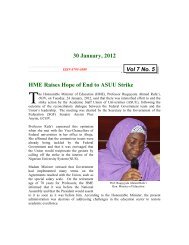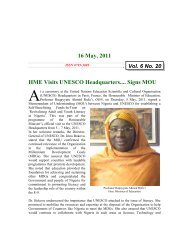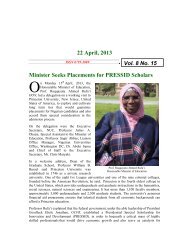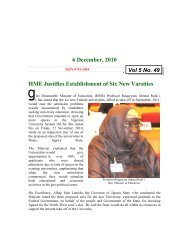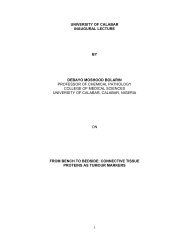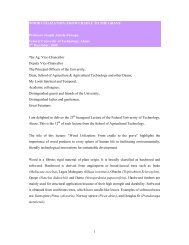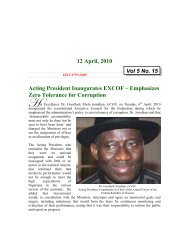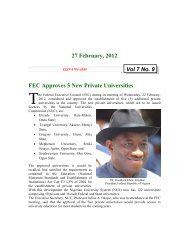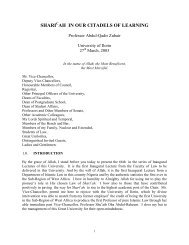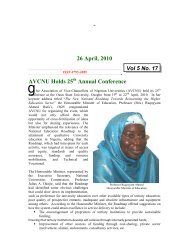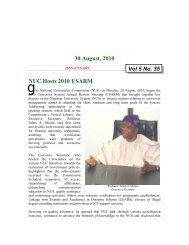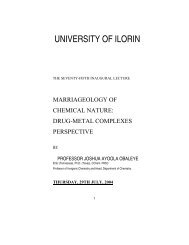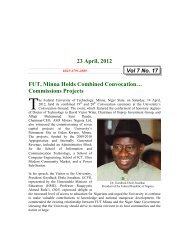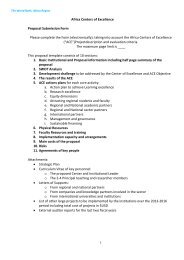From State And State Power To Man And Social - National ...
From State And State Power To Man And Social - National ...
From State And State Power To Man And Social - National ...
Create successful ePaper yourself
Turn your PDF publications into a flip-book with our unique Google optimized e-Paper software.
do so. They then devise devious means by which the local partner pays up both its ownpercentage of the share capital and that of the foreign partner. One strategy is for the foreignpartner to plead unforeseen increases in the cost of equipment and other inputs, and on that basis,demand that the share capital be doubled or trebled. The unsuspecting local partner, having madea substantial initial investment, throws in more money to meet an increased liability and ensurethat the initial capital outlay would not be a waste. In the end, the foreign partner actually makesno financial contribution to the venture.In the 1970s, Nigeria had such an experience with a European MNC which entered into apartnership agreement with the Federal Government of Nigeria to prosecute a project aimed atreinforcing the ability of the country to produce food. The MNC, through a combination ofguile and blandishments, got the Federal Government to pay the full share capital of N2 million,which had, on paper, been increased to N4 million, without apparently fulfilling its own financialobligation, involving provision of 50% of the share capital.[Eme Awa, 1979:5-9]Another method by which MNCs siphon funds away from public enterprises is by supplying, totheir local partners or the joint enterprises, obsolescent machinery which breaks down ratheroften. In some cases, the model of the machinery supplied may be so old that their spare partscan not be easily secured even from those countries which manufactured the machinery in thefirst place. This was the kind of problem faced by Aba Textile Mill (Abatex), which led to itsgrounding in the 1970s. The textile industry was owned by the Eastern Nigerian government(30%) and an American firm, Indian Head Incorporated, Massachusetts, (70%). Later 70% of theshares were transferred to the United <strong>State</strong>s Agency for International Development (USAID).After the Nigerian civil war, the Federal Government bought the shares from USAID and tookfull control of the company. It was only then, that it was realized that the machines recoveredfrom the company at the end of the war were old and obsolete. Besides, the company still owed$1 million out of the $2 million loan secured from the US Export- Import (Exim) bank in 1964.This credit, together with its interest, was converted into a loan at 6% interest. In addition, theExim bank extended another loan of N4.80 million at 6% interest to Aba Textiles on conditionthat this would be used to purchase American made machinery. Abatex accepted this condition.But then, again, the Americans sold an obsolescent model of machinery to Abatex. What wasworse, the spare parts of the newly purchased machinery could not be obtained unless they wereplaced on special orders.The effects on Abatex of the disruption of production and rise in production costs arising fromthe re-payment of the external loans, paying for the special ordered spare parts and generallymaintaining the obsolescent machinery were that:(a) the factory’s production efficiency declined from 70% in 1971 to 27% in 1975.(b) the volume of total trade decreased from 69% in 1971 to 29% in 1973.(c) the company’s financial losses shot up from $654,000 (approximately, N327,000) in1971 to N2.8 million in 1974.(d) The ratio of debts to equity capital increased from 2:1 in 1971 to 5:1 in 1974. [SeeEme Awa, 1979:10-16].Moreover, the meager financial resources of the company were wasted in servicing debts:consequently, the company could not even carry out its primary function which was the25



